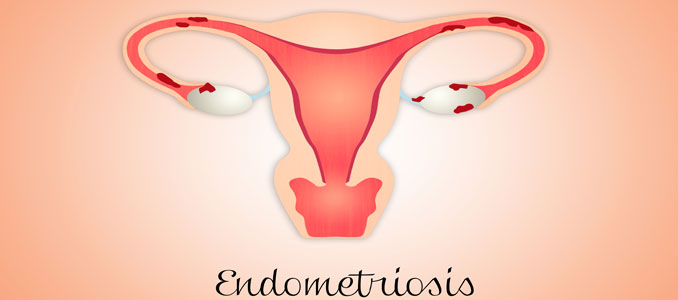Hormone Therapy for Endometriosis
Endometriosis is a hormonal-dependent condition. Since endometriosis development is reliant on a woman’s cyclic production of hormones during her menstrual cycle, hormone therapy can be an effective treatment for endometriosis.
What is Endometriosis?
Endometriosis is a condition suffered by women where cells that normally grow inside of the uterus grow outside of your uterine cavity, usually on the ovaries or the fallopian tubes.
The tissues that line the inside of the uterus are known as the endometrium. During each menstrual cycle, a new lining grows, getting ready for a possible pregnancy. If pregnancy does not occur during a given ovarian cycle, the lining sheds. This is your menstrual period. The hormonal changes that occur during your monthly menstrual cycle have an effect on the misplaced endometrial tissue, causing the area to become inflamed and painful and eventually break down like the cells of the “real” endometrium. Unlike during normal menstruation, the tissue that has broken down has nowhere to go and becomes trapped in your pelvis. This can cause quite a lot of pain and discomfort for women with endometriosis.
Endometriosis Symptoms and Causes
Endometriosis occurs when tissue similar to the lining of the uterus grows in other places where it is not supposed to grow. It is one of the most common gynecological diseases. Its primary symptoms include pain and infertility.
Endometriosis can be a serious condition causing:
- irritation
- scar formation
- adhesions, in which tissue binds your pelvic organs together
- severe pain during your periods
- fertility problems
Endometriosis is a fairly common condition, affecting about 10% of all women. The symptoms of endometriosis vary. Some women experience mild symptoms, but others can have moderate to severe symptoms. The best treatment for endometriosis depends on the severity of your symptoms.
The exact cause of endometriosis remains a bit of a medical mystery. However, there are several plausible explanations for why it occurs. These include:
Although the exact cause of endometriosis is not certain, possible explanations include:
Retrograde menstruation – Retrograde menstruation occurs when menstrual blood containing endometrial cells flows back through the fallopian tubes and into the pelvic cavity instead of out of the body. The endometrial cells adhere to the pelvic walls leading to endometriosis.
Cellular Transformation – There are two theories that suggest that hormonal imbalances somehow cause non-endometrial cells in a woman’s body to “transform” into endometrial cells outside of the uterus. In one such case, “peritoneal transformation,” the cells of the abdomen mutate into endometrial-like cells. The other is “embryonic cell transformation.” In this case, estrogen may transform embryonic cells — cells in the earliest stages of development — into endometrial-like cell implants during puberty.
Surgical scar implantation – After a surgery, such as a hysterectomy or C-section, endometrial cells may attach to a surgical incision. This is known as surgical adhesions.
Endometrial cell transport – Somehow, endometrial cells are carried from where they do belong to where they do not belong by the circulatory or lymphatic system.
Immune system disorder – In this scenario, a problem with the immune system may make the body unable to recognize and destroy endometrial-like tissue that is growing outside the uterus.
How is Endometriosis Treated?
Regardless of how and why it has occurred, endometriosis is treated with various hormone therapies. Endometriosis cannot be cured, but it can be managed. The worst symptom of endometriosis is severe pain. Women describe it as being like menstrual cramps, but much, much worse. Therefore, the first line of treatments is for pain relief. For symptoms that are not so severe, over-the-counter pain medications can be used, or with your doctor’s advice, stronger non-steroidal anti-inflammatory drugs may be recommended.
More aggressive treatments will depend on the severity of the symptom, how close a woman is to menopause, and her desire to become pregnant. Since endometriosis is linked to your monthly menstrual cycle, the symptoms will usually abate when you enter menopause.
There are both conservative and radical surgical treatments available to treat endometriosis. However, for women with severe symptoms who would like to avoid surgery, hormone therapy is an option. Hormone therapy helps to relieve the pain of endometriosis for about 90% of women.
Because hormones cause areas of endometriosis growth to go react to the hormone ebb and flow of a woman’s menstrual cycle, hormones also can be effective in treating endometriosis symptoms.
What Hormones Affect Endometriosis?
Endometriosis is a hormone-linked condition. Specifically, high levels of estrogen can cause endometriosis. Estrogen is the female hormone that is primarily responsible for the thickening of the endometrium during the monthly menstrual cycle.
Endometriosis is predominately an estrogen-dependent condition that is most commonly diagnosed in women who are in their 30s and 40s. The higher amount of estrogen a woman has, the worse endometriosis symptoms can be. This is why hormone treatments designed to better control estrogen production, such as the use of Gonadotropin-releasing hormone agonist (GnRH-a) therapy and aromatase inhibitors, can be effective hormonal treatments for endometriosis.
How Is Hormone Therapy Used to Treat Endometriosis?
Hormones may reduce the number and size of growths (implants) and keep them from spreading. Several different types of hormones are used to control endometriosis symptoms. The first course of hormone treatment for endometriosis is to prescribe birth control hormones. They are usually the safest hormones for long-term use. If they don’t help your symptoms, your doctor may then recommend stronger hormones. This type of hormone therapy is designed to reduce estrogen levels in your body. Because of this, you can’t use birth control hormones if you want to get pregnant. However, birth control hormone therapy will stop both ovulation and the growth of implants. These hormones can be used long-term until menopause.
Other types of hormone therapy for endometriosis include:
- Gonadotropin-releasing hormone agonist (GnRH-a) therapy
- Progestin
- Danazol
- Aromatase inhibitors
Hormone therapy to treat endometriosis has proven to be quite effective. However, you may have to try two or more types of hormones before you find the one that works best for you. Most women have no recurrence of pain for up to five years after using hormone therapy to treat endometriosis.
Who Should Consider Hormone Therapy to Treat Endometritis?
Hormone therapy for endometriosis is a good first choice for treatment for women who are experiencing painful symptoms and are not planning to become pregnant in the near future. The symptoms of endometriosis can be similar to the symptoms of other conditions, such as ovarian cysts and pelvic inflammatory disease.
Finding the right method to treating your pain requires an accurate diagnosis. Your doctor will take a full medical history, a physical exam and may use other diagnostic tools such as ultrasound or laparoscopy to ultimately give you a diagnosis of endometriosis. Once you have been diagnosed, together, you and your doctor will decide if you are a good candidate for hormone treatment for endometriosis.
What Do the Research Studies Say About Hormone Therapy for Endometriosis?
Clinical trials have shown that hormone treatment effectively stops the ovaries from producing hormones, including estrogen, and therefore such treatment can help slow the growth and local activity of both the endometrium and the endometrial lesions.
A 2008 study conducted “a comprehensive literature search to identify all the published observational and randomized studies evaluating the efficacy of aromatase inhibitors on pain associated with endometriosis.” Basically, this is a “study of studies.”
The researchers did an exhausting search to find the maximum number of relevant citations in MEDLINE, EMBASE, CINAHL, and the Cochrane Database. Using the keywords such as “Outcome pain relief,” “lesion size,” and “quality of life.”
There were eight studies (137 women) evaluating outcomes of aromatase inhibitors. In case series/reports (seven studies, 40 women), aromatase inhibitors combined with progestogens or oral contraceptive pill or gonadotrophin-releasing hormone (GnRH) analogs reduced mean pain scores and lesion size and improved quality of life. A Randomized Control Trial of 97 women demonstrated that aromatase inhibitors in combination with GnRH analogs significantly improved pain (P < 0.0001) compared with GnRH analogs alone, together with significant improvement in multidimensional patient scores (P < 0.0001).
The review of all of these studies led the researchers to conclude that “Aromatase inhibitors appear to have a promising effect on pain associated with endometriosis.”
A study in 1999 published in the medical journal Obstetrics and Gynecology was designed to investigate hormone treatment for endometriosis with Depot leuprolide – a hormone-based drug that reduces estrogen production in women. In this study, “women 18-45 years of age with moderate to severe pelvic pain of at least 6 months’ duration underwent extensive, noninvasive diagnostic testing and laboratory evaluation, including pelvic ultrasound, complete blood count, determination of erythrocyte sedimentation rate, and endocervical cultures. Those with clinically suspected endometriosis were randomized to double-blind treatment for 3 months with depot leuprolide (3.75 mg/mo) or placebo.
Women in the leuprolide group had clinically and statistically significant (P < or = .001) mean improvements from baseline after 12 weeks of therapy in all pain measures. This result allowed the researchers to conclude, “[Hormone treatment with] Depot leuprolide was effective and safe for treating patients with chronic pelvic pain and clinically suspected endometriosis, confirming the potential of its empiric use in these patients.”
As mentioned above, Danazol is a hormonal treatment often used to treat women with endometriosis. A 2007 study looking into the effectiveness of danazol treatment in women with recurrent deeply infiltrating endometriosis concluded that “Vaginal danazol resulted in effective medical treatment for the various painful symptoms in women with recurrent deeply infiltrating endometriosis, and because of the lack of significant adverse effects, it may be proposed as an alternative to repeated surgery.”
The study was composed of twenty-one women with deeply infiltrating endometriosis.
Now that you know a little bit more about how hormone therapy can be used to treat endometriosis, why not take a minute to contact us and learn more about the many other life-changing benefits of hormone therapy.
- MAYO CLINIC
- Center for Young Women`s Health
- Medical News Today
- The management of menopause in women with a history of endometriosis: a systematic review L.C. Gemmell K.E. Webster S. Kirtley K. Vincent K.T. Zondervan C.M. Becker Human Reproduction Update, Volume 23, Issue 4, July-August 2017, Pages 481–500
- American Family Physician
- MedicineNet





